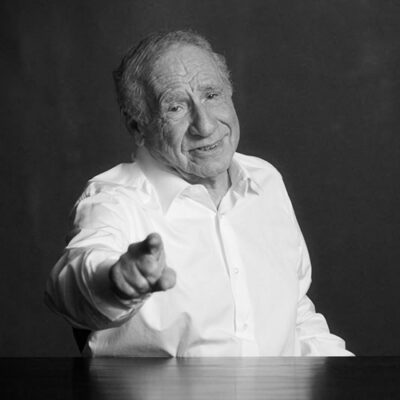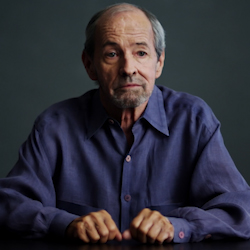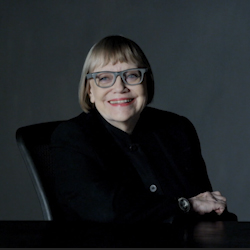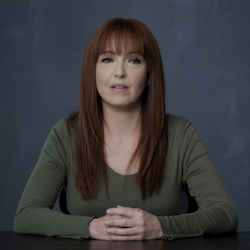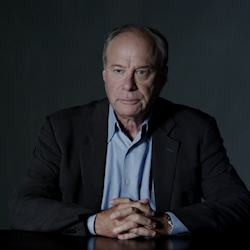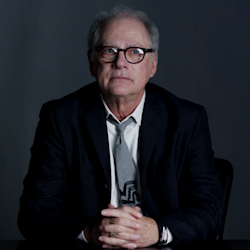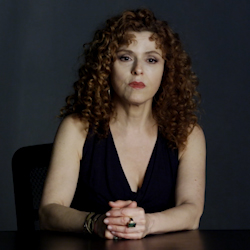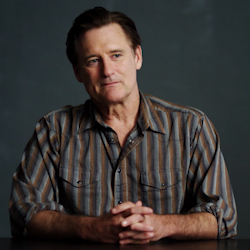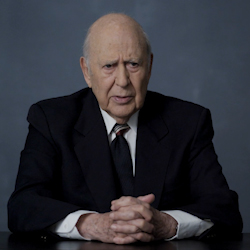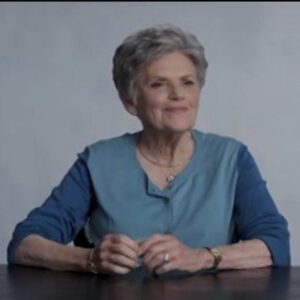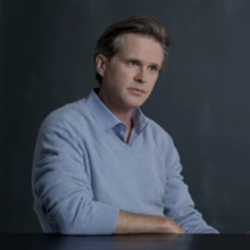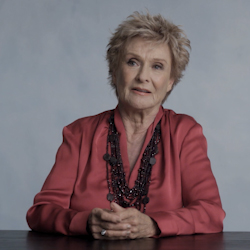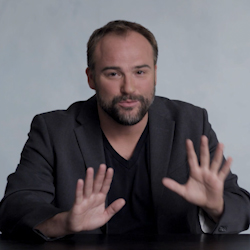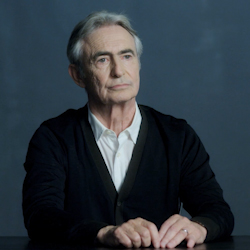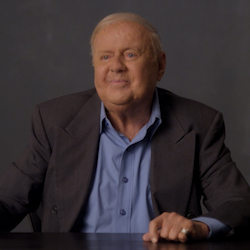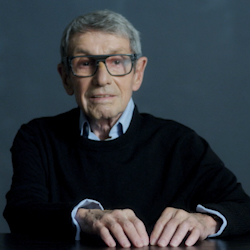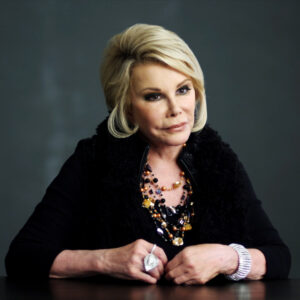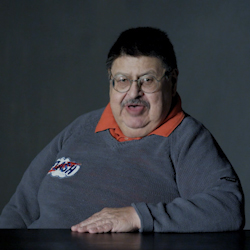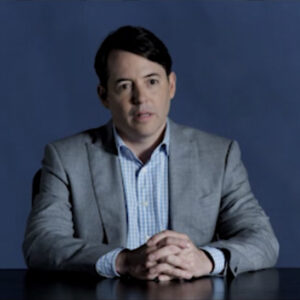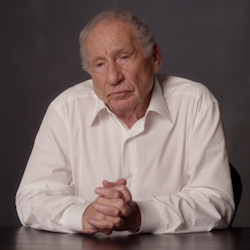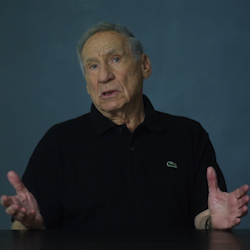Nathan Lane: Well, before I ever was asked to play Max Bialystock, the movie, The Producers of the original film with Zero Mostel and Gene Wilder was. Yes, embedded, I guess, is the right word embedded in my head. I could sort of play it back like a VCR. Remember those? I think I first saw it at a revival house in Los Angeles. And. And the audience just was laughing uproariously. And. And I had never I don’t think I’ve ever seen anyone like like zero on on film before being who could be that large. And yet and yet still it was very real. And and also he had also quiet, subtler moments. But that kind of operatic performance on film. I had never seen anybody do anything like that. And I mean, he really wrote it for him. I think he he has said if he hadn’t done it, he wouldn’t have made the movie, although, you know, who knows? But but I understand that. I mean, he needed somebody you needed. He needed zero, although apparently was not. It was a tempestuous relationship. But. And so it’s always been why it’s one of the great, great comic plots of all time and and and interestingly was not a big success when it first came out. It had its its its lovers and but a lot of detractors who found it vulgar. And then it became this this cult film, a cult classic that people loved. And, you know, over the years it grew and grew and. You stopped me at any point.
Interviewer: It’s all.
Nathan Lane: I got to keep going.
Interviewer: No stuff. What we’re thinking, can we move the full cart in just a little bit more? A little closer? Yeah, just fill it in a little bit more. Nathan looked over at me, kept coming with it. We’ll turn it turn it tall. Yes. There you go. See, Malcolm. Malcolm, look at the monitor. I’m just trying to catch.
Nathan Lane: We got to start again.
Interviewer: No, we’re not.
Nathan Lane: Well, we could.
Interviewer: No, we don’t have to.
Nathan Lane: OK. It’s the atmosphere here. It’s like I feel like any minute I’m going to be waterboarded.
Interviewer: No, no. Maybe. You know Matthew.
Nathan Lane: Yeah.
Interviewer: Matthew has said that he would sometimes watch the film for reference if he was having trouble with something, I guess, during rehearsal. Was that the case with you? Would you reference the film?
Nathan Lane: Well, in many ways, Max Bialystock and Leo Bloom are Zero Mostel and Gene Wilder. I mean, it’s the sort of it’s it’s hard to escape that. You know, the advantage in the in the in the show was that there was a lot of new material written. And and it was interesting. What things? Things that we loved and cherished from the film that just didn’t work on stage at all. Things were really some hilarious lines that we just couldn’t use because they just did. We tried them out and they didn’t. People didn’t really respond or you needed to see it in a in a close up or a two shot. And and and and a great deal of the new material was, you know, worked fantastically. And so, you know, you wanted to keep the best of the film. And and but somehow you you in a strange way, you did have to. Well, it wasn’t like doing an impression or something of them, but it was trying to remain true to that spirit. And and, you know, yes, it was. It really had so much to do with Zero Zero’s performance and was intertwined with the character. And so. And then at a certain point, you have to let go of it and, you know, just play the scene and and see what happened. But at times, you know, if you don’t if you don’t look up to the sky and say, I want that money, you know, if you don’t let loose with a good try and I that that kind of size and that kind of, you know, I desperation and greed. And, you know, someone who was without a conscience, just things, you know, I you know, I want to be successful again at any cost. And I want that money. You know, those things I think you had to you had to live up to.
Interviewer: Tell us about the rehearsal period and Mel Mels involvement. Because Susan was directing for the first time. You know, I am choreographing. So how how did Mel involve himself or not involve himself during the rehearsal process?
Nathan Lane: Well, it’s an interesting I don’t know how much of this story, the backstory you want leading to that, but it’s where some influences what? I had I first heard about it through a friend who a director friend who he had initially approached about doing it, developing the producers as a musical. And and that didn’t last. But that’s how I heard about it. And I thought, well, that’s a great idea. And and over the years, you know, he’d been approached by different people about doing it. Eric Idle wanted to do it with him. And he had said, no, I was I was making a film once with Michael J. Fox, who who one day said to me, you know what, we should do a stage version of the producers and I’ll play Leo Bloom and you play Max Bialystock. And I said, OK. And he apparently had called Mel and he said, No, no, I’m holding onto it. I might do it myself someday. And then, you know, I had heard about this. And then. I was on vacation in London. I was staying at the Ritz and I, I went down to the pool. And in the pool were two people, and it was Mel Brooks and Anne Bancroft and I had met them once. They had come to see a play I was in. And they had been very sweet and gracious afterward. And so I said hello and. And then and left to go upstairs and Mal stayed in the pool with me. And there we were floating. And he said, I’m working on a musical based on the producers. And he said, I think you’re the only man of the world to play Max Bialystock and. And and suggested that Marty Short should play Leo Bloom. And I said when I knew Marty Shorten, I said that would be an unbelievable honor. I would love to be a part of that. And then. Time passed and he had begun working on it with Susan Stroman and Mike Doctorand and and I. He was Mike, I think was very instrumental in the adaptation and what he was going to do with the characters and what changes would be made. And along with Tom Meehan, who I think he was working with, would he had collaborated with on on Spaceballs and and other things. And so. Sadly, Mike was ill and and and he passed away. And so that was quite devastating, obviously, for everyone involved. And then at a certain point, I think he said to Susan, you have to do this. You have to do this by yourself. You can do both. And it’ll be. In a way, it will help you get through this and and obviously, you know, it would mean a lot to me. And. So they had this real. Emotional bond, and I know it was very difficult for her to do it, to go forward without Mike. And there were days when I. I know how she would get. She would go into another room because she would get very emotional about something as joyous a process as the rehearsal was. You know, there was that. That was you know, I’m sure that was just a constant thing for her. And yet and yet she it was a I think she herself has said it was it it so helped her work through all of that. And and so he was it was very, very respectful of her position as director. And was there, you know, strictly as the writer and and obviously, you know, he’s has lots of ideas and, you know, but he he was you know, it was an interesting time in his life, I think, because. You know, he had sort of fallen out of favor a bit, you know, as as everybody does at a certain point. And, you know, he he he, you know, had, you know, huge string of successes and then, you know, and then somebody else comes along and. And I think it was it was difficult for him. And and then this you know, it was it was a great idea to do it as a musical. And then, you know, as he you know, at one point he thought about, you know, should someone else write the score? You know, we went to Jerry Herman and there was there was that process. And when he was an initially approached, you know, or pushed by David Geffen. And then and then Jerry Herman was the one to say, you know, you you you’ve already written two two great songs. You should you should do it then. That was really the right idea. I think it had to be Mel. It had to be his sensibility and. And so, you know, the he was. You know, in a sense, he was slightly vulnerable. There was a world, even though he had written the book to all American. And what was Archie and Mahira about? And they write the right man now about that. And. And he had written sketches for a new faces. And, you know, he’d it had it’s not like he hadn’t been around the theater. But, you know, this was he was he was very respectful of everyone and very, very encouraging and loving and hilarious. And it was a very happy time. And and, you know, it was one of those. So the rehearsal process was it was all it was that rare thing that happens in the theater where all of the right people came together at the right time. And. And so, you know, wherever it was, just what was what was, you know, it’s always surprising was how well it always worked. Well, we did the first reading of it. People were on the floor. It was like people had been waiting for something like this to come along. I couldn’t, you know, I mean, I liked it. I remember Matthew and I weren’t having lunch one day saying this will either be. The biggest hit gets flop in history. There’s just. It could go either way. There’s just something about it that if it’s not the right. Thing, I don’t know. But it was it always seemed to work when we did it and when we opened in Chicago, which was one of the. That was just one of the greatest experiences of my life because. We didn’t know quite what we had, we thought. Oh, a lot of this is very funny and fun and the score is fun. And and and you know, those characters in that story. All of that works. And but now it’s a musical. And now it’s will it will it will it really work. And and, you know, people were it went through the roof at the first at the dress rehearsal and then the first preview. And I remember saying, well, maybe it’s just those diehard fans of the movie, the cult movie fans, and it won’t be like that every night. And then it was. And it was. You know, I have never experienced anything like it in my life, and I don’t think I ever will again. It was just one of those times that. It all everything seemed we couldn’t do anything wrong. It was it was almost unnerving. And, you know, we had everything worked out about Matthew used to say even he was a not so good stuff. Everything worked. They just they were beside themselves. And so all they did when we came into New York was they did some cutting, some editing. And but, you know, people would have stayed there for four hours. It was it was incredible. I’ve never seen anything like it.
Interviewer: I mean, what the character and she said, I’m going to do this. I said. Take my advice. Don’t do it. Do not try to fight this. Just let him go, because if you try to match him, you’re going to lose. You know,.
Nathan Lane: He’s not brilliant. And in many ways, you always interesting seeing it in L.A. and then. And I thought they should have switched parts. Marty should’ve played Max, put on get the Jimminy Blake fat suit and he should have played Max and and and and Jason should have played Leo. There would have been Hilaire. I would’ve been. I just think that’s that was what did. What should have happened. But.
Interviewer: It’s great that Jiminy Glick with Mel. He totally throws Mel for a loop. He says he takes a positive. What’s your beef with Hitler guy? This is love that voice. Yeah.
Nathan Lane: What’s your beef? Yeah, I know.
Interviewer: It is really. Mel is just can’t doesn’t know what to do with himself after a while.
Nathan Lane: Yeah I know it’s tough to and it’s tough to throw now.
Interviewer: Yeah. You know.
Nathan Lane: So where was I. Well what you were saying.
Interviewer: Well you know and so it was a great finish the thought. It was. Wonderful to see Mel have this renaissance. Two people, in a sense, rediscover him and the show was like the best of Mel Brooks. It had and at everything and. And that was it was great to see him having that. He did certainly no. No, nobody deserves it more. And to be, you know, appreciated that way again. And. You know, I can I can remember and coming over after some run through and saying thank you so much for what you’ve done for the show and for getting my husband out of the house. And, you know, that was also aside from how great he was collaborating with Stroman was. Was just spending time with the two of them. I mean, those are my maybe some of my favorite moments of the whole experience was just getting to know them and having dinners with them and and laughing and, you know, because he’s the most entertaining man on the planet. And.
Interviewer: Through.
Nathan Lane: Her and, you know, and was an enormous a cheerleader for the show. I mean, you know, it was always thrilling, you know. And nerve racking, you know, because Anne Bancroft would walk in the room and it was Anne Bancroft. And you wanted not only to do well for from for Mel, but, you know. And she. But, you know, it was it was one of the greatest actresses of our time. And so you wanted you wanted to please her, too. And she couldn’t have been more gracious or more more generous with everybody and made everybody feel special and what in what they were contributing to the show. And I think she knew she knew that was her role. And of course, as with everything she did, she played it impeccably. She was you know, she was just an extraordinary person and. But and what’s a big part of the show? I mean, I just remember. I remember when we had the Zits probe in Chicago hearing the orchestra play it for the first time and she couldn’t be there and he was so he was upset that she couldn’t be there to hear it, you know, because she had been the one who had told him, go up, go upstairs, go write a song today. And then he would come back and have, you know, play it for or and or sing it for her. And she would say, that’s good. And that’s not so good. You can do better than that. I mean, she was instrumental in it. And so when she couldn’t be there for that, he was very upset. And I remember telling her that when she she came for the first few previews and. And she said she said, really? How about that after all these years? It’s still about love. Then she said the greatest thing ever about him. It’s maybe the most romantic thing I’ve ever heard. When she was interviewed by Charlie Rose and she said I’m. You know, the the question that was often asked, and I’m sure it sometimes became tiresome, but how to what do you attribute your longevity as a couple? And. And she said, well, you know, we’re like any other couple we had we’ve had our ups and downs, but she said, every time I hear the key in the door, I know the party’s about to start.
Interviewer: That’s great. You hosted David Letterman and he tried to get you to sign a contract, right?
Nathan Lane: Oh, yes. But that was. You know, there was a yes as a joke, you said. Well, David Letterman, you know, had his heart trouble. So, yes. And I was asked to be one of the guest hosts. And he had never been on the Letterman show. And I said, well, how come you never went on? And he said, I don’t know. He wasn’t so nice to someone I knew. And so I never wanted to go on. He said, But I’ll go on with you. So. So I had him on. And it was, you know, that was thrilling in itself because he’s such a great talk show guest and had certainly, you know, if you’ve seen him on The Tonight Show, he was always brilliant. And I’m. He tell you two things that happened. One was that was that was sort of a joke that he was he pulled out a contract. You know, we’d already. It was not like I wasn’t going to do you know, we’ve got to do a reading of the show. And I was the obviously I wanted to be a part of that. It was a great honor to be asked to play Max Bialystock and but that was his little joke. You know, I’m going to make him do this song, you know, on the air. And so it was it was not really a cut. There was not some people actually thought that he had pulled out a real cut, you know. Wouldn’t there be lawyers involved but and not Biff Henderson. But we did this thing, this winetasting bit on the show, and he had done it before in it. It’s hilarious. And he had asked them. He’s he’s the you know, he’s he’s he’s so many things. He’s an expert on wine. He he he knows knows a lot about wine, you know, has a cellar and and. And he asked them to get. He mentioned some specific wine where there was a Rothschild. I don’t know what it was, but it was. And he asked them. They said, well, how many bottles do you need? And he’s. And it was a rather expensive wine. And he said four or five. And they said, how? Four or five. And he said, yeah, we’ll need four or five. So they do. We do the beds. They only open one. And we did the thing where he tasted. You know, he’s blindfolded. He’s he can. He’s got to instantly tell us what it is. And he would say he wouldn’t rattle off some. A bottle and a year. And we’d say no. And we do a second one. He would rattle off Chateauneuf Pop 1912. No. Then he would taste it. He would go. Budweiser is a Budweiser. Whatever that is. And it went on from there. But at the end, after we finished the segment, he said, wrap those up. I’ll be taking those with me for the other four bottles. Here you go. But yes, no. So now we were always going to. I was always going to do the show. I mean, I did say to him. I did say something about the second act. I said I sort of disappear in the second act. I said there’s no you know, I’m there. But I said there’s no. Is there? Is there. So no. Eleven o’clock. No. Is there. And that’s sort of what led to a song called Betrayed. Initially, he actually he wrote a he wrote he wrote a song that was kind of sentimental, was about. Something Broadway had Broadway in it in the title. But in the middle of it, there was a speech about and it was very I don’t know how this could have happened to me. And it was angry. It was angry and filled with rage. And I said I said the song isn’t right. But I said that that speech about he’s you know, I said this is kind of like Rose’s turn for him. You know, he’s been betrayed by his friend and his best friend and his only friend. And then. So then he wrote poetry.
Nathan Lane: You know, in your experiences is one of the only times where you went out of town with 17 songs and came back with the same 17 songs with E!
Nathan Lane: I. Yes, I know it was a it’s very rare that you go out of town and then you’re not. People aren’t scrambling to make changes and rewrite, you know, numbers in hotel rooms, all those classic things you’ve heard about over the years and. And Chicago. You know, one of the great theater towns, if not the great theater town. You know, it was such a great place to try out the show. And then and they were you know, I never wanted to leave Chicago. There was it was, you know, when we were in this huge the Cadillac Palace. So a former, I think the movie theater that they turned into a logit house. But it was it seated 20, 200 people. So when you get a laugh from twenty two hundred people, it’s a really wonderful, life affirming thing. So I never wanted to leave. But yes, it’s very rare when when when that happens and it literally just a snip, snip, snip here and you know, but it’s still, you know, everything, everything worked out.
Interviewer: I know you’re now you were on the business end of it. Not only did it was it sort of the perfect storm and. Such an amazing hit and all the awards and everything, but it also ended up kind of changing. Was it this show or Young Frank and should change the business of Broadway in terms of the seating, the pricing, all that kind? Or was it you guys would start with the premium? Was that on your show that the premium seat?
Nathan Lane: Yes. Oh, that. Sure. Bring that up.
Interviewer: Well.
Nathan Lane: We’ve destroyed Broadway.
Interviewer: No, no, no.
Nathan Lane: Goodnight, everybody.
Interviewer: No, no, no.
Nathan Lane: Well, they you know, there was no if you really want to get into this but that when it was such a huge success. Really? You know, they like today. Now, the Book of Mormon. That’s a really big hit show. And it’s still continuing to be. But I don’t even think that came close to what was happening with the producers when something becomes this sort of national and cultural phenomenon. And, you know, it was crazy. People were, you know, it was kind of a zayde guy show and that it was just the right thing at the right time. And and it was like going to the greatest party ever. And so, yes, the producers of the producers, I don’t know who who was behind all this. I can’t tell you. I can’t give you names. But put that. Yes, the premium price tickets came up and I believe they’re there. The rationale was that why should the scalpers be getting all the money? Well, we could be making the money. And so then they started to charge. So they became scalpers. Anyway, it’s, you know, what is what do they say? The market dictates it. And it was you know, they people wanted to see it. And so they. Yes. Sell for good or bad it. Yes. I believe it did start with the producers.
Interviewer: Do you have a favorite moment in the show?
Nathan Lane: In the shell.
Interviewer: For yourself.
Nathan Lane: Well, they’re the favorite moment. It’s hard, it’s hard to choose. But. I loved the king of Broadway because it was. It was such a great way to open the show with such a really it’s a tough thing to do to, you know, to bring the house down with the opening the opening number. But we did. It was it was such a fun. The number was fun. It was real. It was just. I believe someone in The New York Times called it. I was just down and dirty in here. We just, you know, it just, you know, grabs you by the collar and said, we’re here to entertain you. And it was you know, it’s just a fabulous song. And the company, everyone was so good at it. And and, of course, you know, and tell him I think is, you know, maybe the best song in the show. I think it’s it’s a it’s a rather. Pretty beautiful song. And. And. And very touching and the courtroom thing, I used to love it that way. Yeah, that was it, because we came up with, you know, I. Because the song has a certain amount of sentiment. When I said when I started to sing it. I thought it’d be funny if I was I’m I’m singing, you know, I’ve already I’ve established it. And then the second verse that I would go out, I would start to leave. Everybody was getting very moved and I would start to leave. And then I said, when I come back, there should be a guy with a gun, you know, following me back on. You know, he tried to tried to get away. So I used to love that. That was a nice little surprise. So those.
Interviewer: You know, what do you do? It’s funny because I said to Mel these first three movies, he made the producers the twelve chairs in Blazing Saddles. It’s OK. The guy gets the guy.
Nathan Lane: Well, yeah. And one said to me, you know, Moul lost his father when he was very young. And so she said very often the stories are father son stories. You know, and an older someone takes an older person taking the younger man under his wing. And. You know, and then the producers that the older man takes the young man under his wing, you know, and corrupts him, then. In the 12 chairs, the younger man takes the older man under his wing and corrupts him and. And then in Blazing Saddles, if everyone’s corrupt but corrupted, corrupted. But I know it’s the amazing thing. You know, if he had done nothing else, if he had just been a writer on your show of shows and and come up came up along with Carl Reiner with a 2000 year old man, he would be in the Comedy Hall of Fame. But then he, you know, made three or four of the funniest films ever made. So he’s, you know.
Interviewer: Did you learn anything from him during the anything specific you can latch onto that you should have learned or what kind of a lesson? It’s not as if it was your you know, you just got off the bus from Kansas. Who wasn’t your first show?
Nathan Lane: Oh, no. Well, it was like everything I had done led me to that point. Everything in my career that I had done. What did I learn?
Interviewer: I know there may not be anyone, and I learned your mouth. You were pretty. I learned a law.
Nathan Lane: I learned humility from mail. Or at least how to fake it. You know, the best luck. You know, one of the great things was. You know, I contributed to the show as a writer. I mean, one of my favorite parts of it is being out of town with him. And, you know. And sitting in the theater and he we need we need another joke here. We need something that, you know, and just sort of improvising or throwing out ideas and, you know. And watching him. Because that’s how in in the writers room. For Sid Caesar, that’s how he worked. You know, people just throw out ideas and he would improvise. What was the first thing he wrote for said was that he should find that footage. Jungle boy.
Interviewer: We’re looking for.
Nathan Lane: Jungle boy. Jungle boy, jungle boy. I hope you can find that.
Interviewer: We’re actually.
Nathan Lane: Ever seeing. I’ve seen it.
Interviewer: You have seen it because seen.
Nathan Lane: I’ve seen the footage. Jungle boy.
Interviewer: There. They’re looking at you. They’re literally getting it from the vault at UCLA to try to.
Nathan Lane: You know that what that thing he said. I said I said Max Liebman wasn’t such a fan of Mel’s and that he said he said basically I belonged to said it was like Heap’s heads said wanted him there for specialty items and for that. Well, you know what? That one moment they needed something and Mel could come up with it.
Interviewer: Yeah. Yeah.
Nathan Lane: But it also, I think. And they sort of knew each other from Tamiment and.
Interviewer: Yeah, and also the the last things is this, the show really the songs in the show there, they so pay homage to other Broadway. Songs.
Nathan Lane: Well, he let’s face it, he he always wrote songs, he loves songs. Ironically, in his bag, probably greatest film, Young Frankenstein, or the one song that was considered he that was the one he didn’t want to do. He thought it was now we’re going too far. And that Gene Wilder had to convince him to go with that that moment, which is now maybe the greatest moment in the movie and putting off putting on the Reds. But but, you know. And wonderful songs. You know, the 12 12 chairs. A hope for the best. Expect the worst. I love that song. And, you know, obviously in the producers, prisoners of love, you know, Springtime for Hitler, you know, it’s he’s he he was destined to write a musical. You know, they were all there. I mean, Blazing Saddles and just goes on and on. You know, he it was in his blood. He wanted to you know, he loves he loves that. He loved Broadway. And and. And finally, finally, it all. It all came pouring out.
Interviewer: You know, so many comics of his generation. They have their concerns end up being the kids. The wife, you know, the mother in law. He’s not concerned with any of this stuff in his from. From your show of shows going forward. These things don’t concern him. The the stuff he’s mining is based in literature history. It’s a kind of unique.
Nathan Lane: Moul is a fascinating combination of elements. And he is. And you see it in the in the in the in the writing. It goes from references to Dusty Lafsky and Kafka to, you know, the two. Well, I guess what some people call it, you know, Catskills or Borscht Belt or. But it’s you know, he’s he loves wordplay. He, you know, and he’s he he can be as silly as anybody. And also, you know, he’s he’s extremely literate and well read. He knows a lot, just a little bit about everything. As he likes to say. He’s an A.D., He’s almost a doctor. So literally, you can give him symptoms and he’ll you know, I wouldn’t go into an operating room with him, but he’s amazing diagnostician and he and wine and, you know, he’s he’s a fascinating human being. And and so much more than sometimes I think whatever his the the image is or what people you know, he’s much more than people. What people give him credit for. He’s. And vastly entertaining and and and witty and.
Interviewer: You know, my last question is where, John, why must we?
Nathan Lane: I’m just getting warmed up.
Interviewer: I know you can keep going. I have this question, which was, you know, a lot of times when I’m talking to him and we’re killed, reference stuff and I’ll say that. But it’s a cheap joke, but it’s a cheap joke. No.
Nathan Lane: Yeah. That doesn’t usually that doesn’t stop him. No.
Interviewer: So. So I’m asking you because this has come up and it’s been really interesting. What’s what’s your definition of a cheap joke?
Nathan Lane: Well, you know you know, there’s a story about Jerry Zaks told me about when he worked with Zero Mostel. He was in a company of fiddler playing Mottle the Tailor. And and there was a. There was a moment he had with zero where? Where he he must have zero must he’d said he wanted to marry his daughter and he, you know, I don’t know, he fell on him or something. There’s a lot of stories about zero. I could tell. But he he did something and Jerry was sort of startled and he he would do something to kind of a kind of like shook off whatever it happened and zero. And he got a big laugh. And then he started and he felt he started as it went. As the show went on, he started to sort of add to it and he got a bigger laugh at him. And, you know, and then at one point he was asked to come to Gerald’s dressing room and he said. And Zero said, Jerry says that that little thing you’re doing at the end of this scene there. She said, it’s very funny. It’s very funny. He says, but you don’t need it. It’s cheap. And believe me, I know cheap. You know. You know, it’s like the Mike Nichols refers to it as, you know, killing your babies. You know, your favorite little little pieces of business are things that you don’t mean aren’t always telling the story. You know, what’s a cheap joke? Don’t know. To me, it doesn’t seem if it’s getting a big laugh. Well, I get, you know, is achieved what is what is cheap, cheap lab. When they say that cheap laughs that’s usually from people who aren’t funny.
Interviewer: Well, and now.
Nathan Lane: That’s a cheap laugh.
Interviewer: Well, I was talking to Tracey Ullman.
Nathan Lane: Yeah.
Interviewer: From him, which I have to kind of remind him of what he was talking about that period in the Spaceballs period. You like you know, we think all these 40 year olds complaining about going to the movies and you get a sitter. The parking’s tough. You think, you know, essentially the 14 year old, they don’t worry about that stuff. They go just to be entertained because I’m writing lower, you know, because I just want to put see, you know, asses in the theater. And the key for those movies is not to justify them because then they’re not so terrific. But one is concerned that it seems was writing at the level of, say, Blazing Saddles, Young Frankenstein. Yeah, but yeah, you’re right. They’re full of really incredibly.
Nathan Lane: I guess. Yeah. I guess the obvious obvious jokes are would be called considered cheap.
Interviewer: All right. I mean, there is also familiar jokes in the show and the producers to me.
Nathan Lane: Well, I’m trying to think.
Interviewer: I mean, there was stuff.
Nathan Lane: I don’t know. I mean, I you know, there are jokes in there. There’s such as so many smart jokes, you know. You know, like there was a job that I love that that didn’t work on stage where he says, is it you know, he says, is it good? I mean, is he bad? And he said, he’s the worst director. And, you know, in the history of the theater. And he says, will he do it? And it’s also zero’s reading of this. He says, will he do it? This is only if we ask him. And I I used to love that job, but because it did so to me, it’s so funny. Only if we ask. But somehow I think you have to see that in close up onstage. Literally, there would be nothing. I’m I’ve nothing. I said that’s a that’s a really funny joke. I mean, everything. You know that there’s a lot of smart stuff.
Interviewer: Well, Tom also said that there was a thing where you guys needed to do a scene change, and so they needed to write some additional lyrics to Springtime for Hitler. And they went off with Mel and like Mel in 20 minutes, came back with, you know, two to let what’s his name stay onstage long enough to do. Right. You know, but fast. And I don’t know if it was that particular thing where he came up with Adolph Elizabeth, Hitler.
Nathan Lane: Adolph Elizabeth.
Interviewer: It’s just.
Nathan Lane: Adolf Elizabeth Hitler. Yes.
Interviewer: It’s just.
Nathan Lane: At one point, they they wanted to do something and they there was in Chicago. It was only in Chicago. They let him. They were trying. It was maybe it had to do something with the scene change or whatever. But when Gary does this sort of Judy Garland moment of sitting on the edge of the stage, he wrote a big speech for him to do about. Hitler talking about everywhere when he wasn’t doing so well and before he was asked to be chancellor. And he said. Everyone was. Everyone was doing well and I was working in the lounge and I wrote this long monologue. And some of it was hilarious, but it just it became like it was like from another show or that there was another it went in another direction and it was to sort of took you sort of too far out of that. No, but some of it was very, very funny. I forgot what we were talking about.
Interviewer: Well, well.
Nathan Lane: What they did. You know, he likes you know, he likes them. He like he’s like he likes a smorgasbord of comedy. I mean, also, you know, as Gene Wiler said, some, you know, he can be, you know, will throw at you. You throw enough of these at the wall and a few of them will stick and some won’t. And, you know, will. But, you know, when he but when he’s on target, he he’s you know, I mean, look, he’s he’s a comic genius. He’s the first. He’ll be the first one to tell you. And he’ll be right. He’s an adorable comic genius. But, you know, some you know, really, you know, he’s look at the 12 chairs. That’s the one I’ve always asked him. I turned that into a musical. Why don’t you. That’s the one I’d like to do. I love the 12 chairs. Based on a Russian. Novel. But but that’s that version. There’ve been other movie versions of that story. But Mels is probably the best known, although a lot of people don’t know it that well. It’s I think it’s pretty funny stuff and maybe maybe the darkest. Like I love. I love that. I love that. What did you. Maybe and I think that’s his best performance as an actor. It’s him as the servant. Teco. Take a look at that.
Interviewer: When did you first become aware of him? The two thousand men recording.
Nathan Lane: The 2000 year old man? Yeah, sure. Yeah. Hilarious. I mean, that’s how, you know, when they said, what are you good at? What do you. When we talked about what Max Bialystock would wear, I, you know, in the opening number and I said, we have to do that. I need a hat. You know, that I had that comes down on one sign that comes up every year. You know, I mean, the hat was going to be important anyway. But I said, but the head should be, you know that. And the Cape. That’s what he used to wear. You know, when he would go on The Ed Sullivan Show, he would have a cape. And that hat. That’s what where that came from. Yeah, that that was when I first was aware of him.
Interviewer: So that record came into your house.
Nathan Lane: I don’t I don’t know whether we don’t know whether we had. I don’t think we had a photograph. We were I was very poor. That’s another American masters. But I was very poor. So I don’t know. I heard it somewhere else. You know, as I got older, I got I got a record. You know, somebody got. I got the record and heard it. And.
Interviewer: Anything I’m forgetting about that you want to say, because I think you and.
Nathan Lane: Oh. Well, I you know, Matthew. We could talk about Matthew. How how he got involved because, you know.
Interviewer: Well, yeah, let’s take it on that.
Nathan Lane: And left it with Marty Short and I. Matthew will leave the air that there. Matthew will say, why didn’t you, you know, when you mentioned me?
Interviewer: Well, let’s let’s mention that because he will do.
Nathan Lane: As you just mentioned, Marty Short. He didn’t actually do that. You didn’t tell me that.
Interviewer: Well. So you came onto it and then tell us how you and Matthew hooked up.
Nathan Lane: Yes. Well, then and then Marty Short couldn’t do the show. He didn’t want to leave. He had done a show in New York just recently. He didn’t want to leave his family for that long, and which is he couldn’t commit to doing another show. And then they said, Matthew Broderick. And I said, well, that’s, you know, perfect. That that would be that would be perfect. And we had we had done we had been in we had done voices in The Lion King. So we had met, you know, at the premiere, but we didn’t really know each other that well. And. And certainly that was a that was also a part of the success of the show, is that relationship? I mean, that that we we became friends doing the show and. And The New York Times Review. Gee, they haven’t been as nice since. But in The New York Times Review, they were very nice to both of us. And then he, the critic, compared us to we had the chemistry chemistry of it was reminiscent of Liam Neeson and Natasha Richardson and Anna Christie. But you haven’t seen chemistry like that like this since then. And Matthew said. Which one of my my Liam Neeson. But that was a. That was a big part of. I mean, obviously it was a tremendous company of comic actors and everybody. Everyone was. Crucial. To its success. But but that was that, you know, that was a special thing, you know, I you know, it’s it’s it’s not it’s something that was commented on and, you know, not something that we’re, you know, we thought about. But it was obvious that we we we did have a chemistry that really worked for the show. And. And then, you know, they you know, and then when other people took over. Apparently it wasn’t quite the same. So I heard.
Interviewer: You know, when when I’m looking at the footage of the there was actually on PBS, the making of the recording. And it’s it’s interesting what you were saying about and saying about Mel’s father dying because he evolved from being that, without question, the sort of brat at your show of shows being this really patriarchal figure for not only you.
Nathan Lane: I had done, you know, the play that they had come to see was laughter on the Twenty Third Floor, a play by Neil Simon about his days in the writers room for the Sid Caesar show. And I played this Sid Caesar like a character, Max Prince. And there was a Mel Brooks character in it who was who always came late, was kind of a hypochondriac and very outspoken ad. And I remember so Mel, Mel and Ann came and and he was very they were very gracious and sweet. And then and but I remember Mel saying, oh, yeah, that character based on me. He said, it’s a tissue of lies, the issue of lies. But, yeah, I you know, apparently he was, you know, but he was you know, he was Sid’s favorite in a way. You know, him running. You know what that was the Neil Simon used to say, you know, had used to tell stories about, you know, him walking down the street with Mal. And he would always do outrageous things, you know, or say like to to you know, one day they were walking down the street and he saw two nuns, two nuns coming coming their way. And he, Neal, was frightened what Mel might say. And so they just as they passed them, he turned and said, you’re out of the sketch. But or, you know, he Melwood come in late and he come running and slide across the rehearsal room and said, we’ll go safe or throw it. He brought Iida in the play. The Khary because it throws his hat across the room and says Lyndy made it. Linda made it so.
Interviewer: But the thing is, is that when I see the record, the taping of the. Yeah, he’s become such a patriarchal figure. So many. And you and Matthew are you. It’s really touching how you guys are looking at him. Well, during the recording session, such love and admiration, you know, Wall and he’s again, it’s edited. What can I tell you? But he’s pretty laid back about, you know, and just, you know, praising you guys on takes and sort of supervising with Susan and, you know.
Nathan Lane: Yeah. You know, he was very. You know, I think it was a it was a very it was a very good time in his life. It was. Maybe he’ll he has said it the happiest because. You know, it was it was. It was wonderful to have that kind of success again. But with something that, you know, he obviously was proud of and and with people that he really cared about and sharing it with Ann and the whole thing, I think was, you know, just a very special a special thing. And yeah, it is a nice. It was really wonderful to get to share that with with with someone like that, with a legend. You know, he. You know, we had we had so many good times, and then again, it happened in London when we I went over at the last minute and took over and we had it was always like it was like New York and Chicago all over again. People would say, oh, you know, it’s London. They won’t they’re not going to they won’t stand up. They won’t laugh as much. And then, you know, and I said, great. And then we got to the first preview. And, you know, they they were laughing their heads off and they were on their feet. And it was, you know, it was just as successful and was you know, we had we had such a good time.
Interviewer: He tells that story of having Stroman call you. He’s not going to want to do it. He’s got to cry, cry on the phone, cry for him. He tells us that.
Nathan Lane: He did.
Interviewer: Yeah.
Nathan Lane: Well, he did.
Interviewer: Cry for him and said, I don’t want to cry for him, you know. There’s a couple stories throughout his career like that where he got sent people back to do to get what he wants.
Nathan Lane: He. Well, the notion was it was just a wee I had just finished doing. We Susan and I had done the frogs at Lincoln Center. Stephen Sondheim musical. And then. And I was really physically exhausted. And then I was going to rest. And then we were supposed to make the film version of the musical The Producers. And so I was trying to rest and gear up for that. And I literally had arrived at my house in Long Island and got a call to call her. And, you know, and she. And she said, you know, it’s not working out. And. And could you come over? And I was like. I said, I don’t know if I can. I’m just I’m so tired and I. I love you all, but I don’t think I can do this. And I said, well, let me think about it and. This was on a Thursday, and they had to be there the following Monday and then they were gonna start previews on Friday. So so I call her the next day and I said, listen, I love you, but I just I just can’t I just feel I should take care of myself and rest. And for the movie. And she started to cry. So now it’s hilarious that they he said to her. Cry, cry, cry, cry for him. She started to cry. Well, she was very believable. You know, she was I totally bought it. And, you know, the minute she started to cry, I said, OK, OK, I’ll come back. And the next thing I knew, I was on a plane. And I on Tuesday, I was standing on the stage of the Theatre Royal Drury Lane. And you know what it was. I’m so glad it happened. It worked out. You know, that was that was a whole other adventure with Lee Evans played Leone. He was spectacular. And it was it was, you know, other than being tired. It was it was thrilling, thrilling to be in the West End for the first time and to be doing that and for it to have been successful again. You know, we you know, it was and we just had we had so much fun going. Going out afterwards. And it was it was a great a great, really, really great time.
Interviewer: Anything you want to say about the movie?
Nathan Lane: About what?
Interviewer: The movie version.
Nathan Lane: Our film version. You have the producers. Well, as I like to say. It’s the I think it’s the most expensive Lincoln Center archive recording ever done. You know, there’s there’s not too much to say. I’ve sort of disgusted and it’s you know it. You know what? Just. It wasn’t a good it was it was a difficult thing to transition to taking if he had taken the screenplay and turned it into a very successful libretto and then but then taking that and turning that into a movie musical and making it back into a movie again, I think, you know, A, he just felt just film the show, which is sort of what happened. And so it was awkward. It was not, you know. But, you know, at a certain point, it was like, well, what are we going to do? Remember, Matthew, just say, I don’t know. What else do you. I’m just going to do what we did. You should hope for the best. But it is, you know, some of it is. But some of it is very funny. Some of it makes me laugh. You know, it’s it’s it was you know, it really had needed to be rethought more. I thought, in terms of a screenplay. But, you know. But I often hear, you know, like kids now like it or very fond of it or, you know, you get a kick out of it. I you know, if you’ve never seen the original, maybe it works. But, you know, it’s it’s.
Interviewer: Yeah.
Nathan Lane: Look at it. Where, you know, it’s so now it’s made it went full circle. It was a cult film to a cult film.

